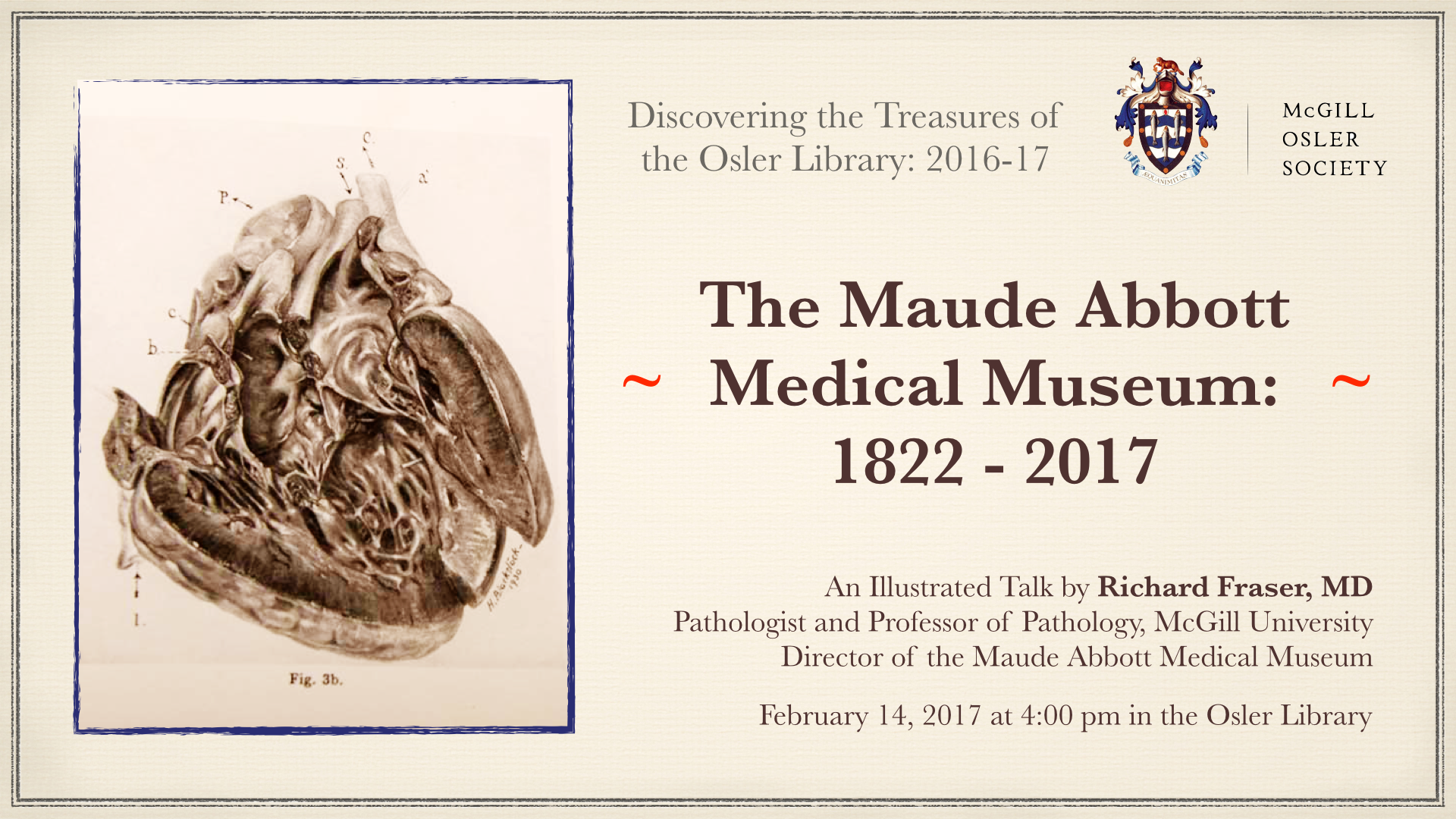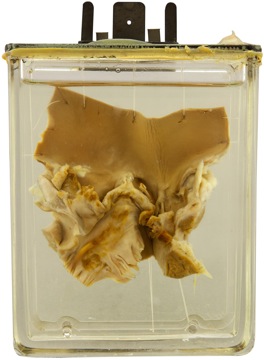You’re invited! Please join us next Tuesday February 14th, 4pm for an illustrated talk by Dr. Richard Fraser, Professor of Pathology at McGill Faculty of Medicine, Senior Pathologist at MUHC, Director of the Maude Abbott Medical Museum.
Tag Archives: Maude Abbott Medical Museum
Homecoming
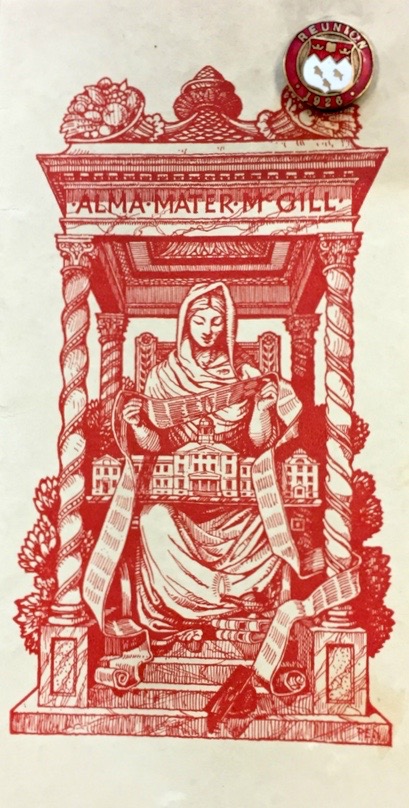
McGill Faculty of Medicine reunion programme and pin from October 8, 1926 with songbook inside. Part of the Osler Library Archive Collections.
Events, talks, and tours are happening all weekend long from October 27-30 at the Faulty of Medicine in celebration of McGill Homecoming 2016.
This year’s reunion welcomes milestone anniversaries for MDCM graduate years ending in 1 and 6.
Full events listing for alumni can be found here, and further information here.
Open Doors at the Osler Library of the History of Medicine (free event) is happening Friday 1:30-2:30pm, and Open Doors at the Maude Abbott Medical Museum (free event) is Friday 3:00-5:00pm. Rediscover the library’s treasure trove of rarebooks and medical atlases, and also take in one of the best historical collections of anatomical and pathological materials in North America.
Wishing the alumni an enjoyable and memory-filled weekend as they journey back to their McGill roots!
New exhibition: Knowing blood / Sang sens
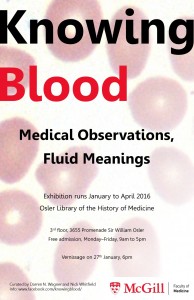 Knowing Blood: Medical Observations, Fluid Meanings
Knowing Blood: Medical Observations, Fluid Meanings
This exhibition is about observations, meanings, and understandings of blood from the late 15th to the mid-20th century. Blood has long been a powerful and evocative symbol, signifying themes from life, identity, community and kinship to sex, lineage, violence and death. Practices of observing blood in experiment, diagnosis, and therapy have also varied widely: a melange of cells seen under a microscope, a pulse felt by a trained touch, the taste of blood from a barber-surgeon’s bowl, a map comparing hematological and racial groups. Modern Western medicine has known not one but many kinds of blood.
Knowing Blood queries how various practices of observation have encountered the multifarious meanings of blood and negotiated new medical knowledge. The objects, texts, and images displayed here are drawn from the collections of the Osler Library of the History of Medicine, the Humanities and Social Sciences and Schulich Libraries, the Maude Abbott Medical Museum, and le Musée des Hospitalières de l’Hôtel-Dieu de Montréal. Five thematic cases highlight different historical approaches to observation, their relation to changing systems of medical practice and to blood’s broader meanings. We invite you to explore this rich 400-year history of knowing and observing the most vital of bodily fluids.
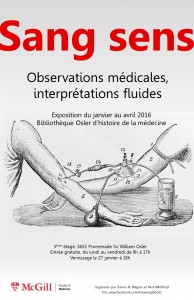 Sang sens : observations médicales, interprétations fluides
Sang sens : observations médicales, interprétations fluides
Cette exposition porte sur l’observation, la signification et les représentations du sang de la fin du XVe au milieu du XXe siècle. Évoquant des thèmes de vie, d’identité, de communauté et de parenté, mais aussi de sexe, de génétique, de violence et de mort, le sang constitue depuis des siècles un symbole puissant. Les pratiques d’observation du sang dans les contextes expérimental, diagnostic et thérapeutique ont par ailleurs largement varié; depuis un mélange de cellules aperçu sous un microscope à un pouls tâté minutieusement, en passant par une certaine odeur détectée après une saignée ou encore une carte du monde comparant divers groupes hématologiques et raciaux. La médecine occidentale contemporaine a ainsi connu non pas un mais bien plusieurs types de sang.
Sang sens interroge les croisements multiples entre ces diverses pratiques d’observation et d’interprétation ayant contribué à la mise en place de nouveaux savoirs médicaux. Les objets, textes et images ici exposés sont tirés des collections de la bibliothèque Osler d’histoire de la médecine, de la bibliothèque des sciences humaines et sociales et de la bibliothèque Schulich, du Musée médical Maude Abbott, et du Musée des Hospitalières de l’Hôtel-Dieu de Montréal. Cinq vitrines thématiques mettent en évidence différentes facettes historiques de l’observation ainsi que leur relation avec les systèmes de la pratique médicale et les significations variées du sang dans divers discours. Nous vous invitons à découvrir cette histoire riche de 400 ans au sein de laquelle a été imaginé et montré le plus vital des fluides corporels.
The vernissage will be held on January 27th at 6PM and is open to all / Le vernissage aura lieu le 27 janvier à 18h et est ouvert a tous.
The exhibition is accessible during library opening hours, Monday-Friday, 9AM-5PM/ L’exposition est accessible pendant les heures d’ouverture de la bibliothèque, lundi à vendredi, 9h-17h.
Osler Library of the History of Medicine, McGill University, McIntyre Medical Building, 3655 Promenade Sir-William-Osler
New issue of the OLN
The latest issue of the Osler Libary Newsletter can now be found in electronic form on our website. Articles from no. 118 include a look at the Iconographique photographique de la Salpetrière, an examination of Vesalius’ legacy and Osler’s medical humanism, a list of Canadians who graduated with an MD from the University of Edinburgh in the first half of the 19th century, a discussion of the early years of the Montreal Neurological Institute and its connection to the Neurological Institute in Breslau, a glimpse of McGill’s Maude Abbott Medical Museum, and more.


